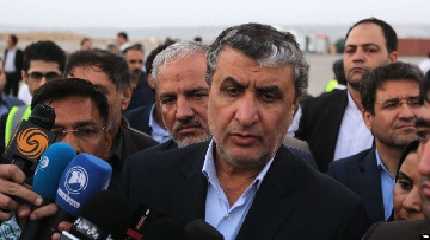
TEHRAN, March 5 (Xinhua) -- Iran and the International Atomic Energy Agency (IAEA) on Saturday agreed to "exchange documents" by mid-June to settle remaining issues, official IRNA news agency reported.
Mohammad Eslami, head of the Atomic Energy Organization of Iran (AEOI), made the remarks at a joint press conference with Rafael Grossi, visiting head of the IAEA in Iranian capital Tehran.
"Today, we reviewed the remaining issues with Mr. Grossi... and reached a conclusion. It was decided to exchange the required documents between Iran and the IAEA by the end of (Iranian month of) Khordad," which falls on June 21, said Eslami.
"At this stage of the negotiations in Vienna and in the final stages of the talks, one of the red lines of Iran is that the alleged cases should be closed forever and do not cause any inconvenience," he added.
Political influences and lobbying should not affect the decisions of the UN nuclear watchdog, Eslami said, adding that Iran and the IAEA should follow the issues in a completely professional way and behave within the framework of expertise, as there is no room for any political measures.
The AEOI head blamed Israel for creating "obstacles" in the way of Iran's "peaceful nuclear program," saying that if someone wants to obstruct the Vienna negotiations with false claims, Iran will use its authority and deal with it.
For his part, Grossi said that there are still some specific issues that need to be resolved hence, they had now "decided to try a practical, pragmatic approach" to overcome them.
He stressed the Vienna talks and the Iran-IAEA cooperation are interrelated, adding if Iran and the IAEA do not reach an agreement on safeguards issues, it will be difficult to reach an agreement in the Austrian capital.
"It is very important to reach a mutual understanding for cooperation. Nuclear energy is very important for the development of countries, including Iran," he said.
Iran and the remaining parties to the 2015 nuclear deal, formally known as the JCPOA, are currently involved in negotiations in Vienna seeking to settle disputes about the revival of the JCPOA.
Iran signed the JCPOA with world powers in July 2015. However, former U.S. President Donald Trump pulled Washington out of the agreement in May 2018 and reimposed unilateral sanctions on Iran, which prompted the latter to drop some of its nuclear commitments one year later and advance its halted nuclear programs.




